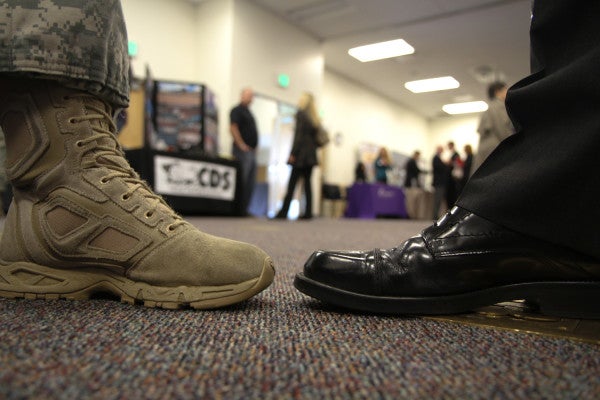5 Ways A Civilian Mentor Can Propel Your Military Transition
Trending now is an American public that yearns to give back to the men and women that have served this...

Trending now is an American public that yearns to give back to the men and women that have served this country. Civilian professionals by the dozens are volunteering their time to mentor veterans during their transition from the military.
Having a civilian mentor during a military transition can be a significant game changer. There are many benefits that directly result both from a mentor and mentee perspective. Even if you already have a job lined up, a civilian mentor relationship can do wonders for your professional career. Here are five ways having a civilian mentor transformed my transition and provided a new perspective on my professional career.
1. They offer a different perspective on the job market.
First, a mentor relationship provides a springboard for invaluable feedback. Any ideas regarding your career search including application procedures, resumes, and interviews could be vetted by your mentor. One of the struggles that I had during my transition was figuring out what type of position and industry I wanted to pursue. Sure, anyone can speculate what type of position could be a good fit, but without that experience it’s so difficult to say for certain. Through discussions with my mentor we were able to conclude what types of positions would be best for me based on strengths and leadership style. Having that invaluable feedback coupled with experience really made an impact on my transition.
2. They can give you feedback on your resume.
Resume critique can be extremely helpful especially for a military transition. Often veterans have difficulty translating their military accomplishments to corporate, bottom line metrics. Having that civilian mentor can help you gain a much better understanding of what a hiring manager is seeking. My mentor happened to have a colleague that was excellent in resume crafting. I’ll never forget his email: “Send me his resume and any evaluation reports and I’ll make him look like a rock star. “ It was one fantastic resume. There’s a really strong chance I will never use another format other than the one he provided. Obviously, results will vary wildly on the amount of feedback or resume help you should expect to receive in a mentor relationship. But, this illustrates that you never know someone’s strengths or who they may be connected to and their strengths.
3. You can learn from their experiences and mistakes.
The number one reason for the mentor to mentee relationship is that gap of experience. A mentor has gone through years of job or industry experience, which is impossible to put a price tag on. If we stop, listen, and show interest, we can learn so much just from the voice of experience. In my situation, my mentor was prior military and made the transition himself. It was interesting to learn what he took away from the experience and his own transition. I always took notes on our discussions and directly applied those experiences to my own unique situation. What good is learning the experience without finding a way to directly apply it?
4. They can help you with your interview skills.
A mentor can provide interview coaching. Interviewing practice is important, but feedback is twice as important. During a conversation, ask your mentor to conduct a practice interview in order to feedback based on their experiences. It’s a great way to get multiple avenues of feedback with interviewing and a mentor can do just that.
In my own experience, having a civilian mentor really was beneficial during the closing of my job. I received an offer from a company and was all set to counter offer. I had created logical reasoning behind why I deserved a higher salary. After pitching it to my mentor, we both reached the conclusion that it was not the best approach. We spent the next 30 minutes discussing what constituted a good counter offer. Had I not had someone to ask those questions my transition could have gone much differently.
5. They provide new opportunities for networking.
Last, having a civilian mentor is a connection; a connection that you didn’t have beforehand. In a world where “it’s not what you know, but who you know,” having a great relationship with an experienced professional is powerful. There’s no telling how the two of you could potentially give value to one another in the future.
There are so many fantastic upsides to a mentor relationship both professionally and personally. Transitioning veterans are bombarded today with a barrage of resources to facilitate a successful transition. It’s up to the veterans to sift and filter through which resources are best for their own unique situation. However, I just filtered one out for you. Get a civilian mentor. If you don’t know where to start, American Corporate Partners is one resource that connects you with a civilian mentor based on your unique preferences. Step outside of your comfort zone, create a real connection, and make a successful transition out of the military.